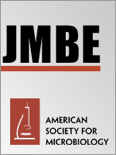
Journal of Microbiology & Biology Education
Scope & Guideline
Championing Open Access to Microbiology Knowledge
Introduction
Aims and Scopes
- Innovative Teaching Strategies:
The journal emphasizes the development and dissemination of innovative teaching methods, including active learning, cooperative learning, and inquiry-based learning, which enhance student understanding and engagement in microbiology and biology. - Research-Based Education:
It promotes the integration of research experiences into the curriculum, particularly through Course-Based Undergraduate Research Experiences (CUREs) that allow students to engage in authentic scientific inquiry. - Interdisciplinary Approaches:
The journal explores interdisciplinary connections in biology education, linking microbiology with other fields such as environmental science, public health, and bioinformatics to enrich the educational experience. - Diversity and Inclusion:
There is a strong focus on diversity, equity, and inclusion within biology education, addressing the need for pedagogical strategies that support underrepresented groups and foster inclusive learning environments. - Student-Centered Learning:
The journal advocates for student-centered pedagogies that prioritize student engagement, agency, and active participation in the learning process, aiming to cultivate scientific literacy and critical thinking skills.
Trending and Emerging
- Course-Based Undergraduate Research Experiences (CUREs):
CUREs are increasingly highlighted as transformative educational experiences, allowing students to engage in authentic research while developing critical scientific skills and fostering a sense of belonging in the scientific community. - Integration of Technology in Education:
The use of technology, including virtual labs, online simulations, and digital learning tools, is becoming more prevalent, reflecting a shift towards blended and online learning environments that enhance student engagement. - Focus on Scientific Literacy:
There is a growing emphasis on developing scientific literacy among students, equipping them with the skills to critically engage with scientific information and participate in public discourse on science-related issues. - Mental Health and Wellness in STEM:
Recent publications show an increasing focus on mental health and wellness initiatives in STEM education, recognizing the importance of supporting students' well-being in challenging academic environments. - Community Engagement and Service Learning:
Research is increasingly addressing the role of community engagement and service-learning in biology education, highlighting how these experiences can enhance student learning and foster connections between science and society.
Declining or Waning
- Traditional Assessment Methods:
There appears to be a decreasing emphasis on traditional assessment methods, such as standardized testing, as more innovative and formative assessment practices gain traction in the journal's publications. - Basic Laboratory Techniques:
Papers focusing solely on basic laboratory techniques without integration into broader educational frameworks or research experiences are becoming less frequent, indicating a possible shift towards more complex, inquiry-based approaches. - Isolation of Microorganisms:
Research centered on the isolation and identification of microorganisms for educational purposes is waning in favor of more interdisciplinary and applied research topics that connect microbiology to real-world issues. - Lecture-Centric Teaching:
There is a noticeable decline in papers advocating for lecture-centric teaching methods, as the focus shifts towards interactive and participatory learning experiences that engage students actively.
Similar Journals
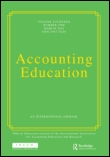
Accounting Education
Transforming Accounting Pedagogy for Tomorrow's LeadersAccounting Education is a leading academic journal dedicated to advancing the field of accounting education, published by Routledge Journals, Taylor & Francis Ltd. With an impressive Q1 ranking in both the fields of Accounting and Education, the journal serves as a vital platform for educators, researchers, and practitioners interested in the evolving pedagogies and methodologies in accounting education. The journal’s focus is on disseminating high-quality research that addresses contemporary challenges and innovations within accounting teaching, supported by an extensive archive from 1992 to the present. While currently not open access, the journal is known for its rigorous peer-review process, ensuring that only the most impactful research is published. With its high Scopus rankings, including a notable 92nd percentile in Business, Management and Accounting, Accounting Education provides invaluable insights and fosters professional development, making it an essential resource for anyone committed to enhancing accounting education.
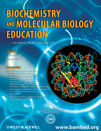
BIOCHEMISTRY AND MOLECULAR BIOLOGY EDUCATION
Transforming teaching practices with cutting-edge insights.BIOCHEMISTRY AND MOLECULAR BIOLOGY EDUCATION is an essential publication in the field of biochemistry and molecular biology, published by Wiley. With an ISSN of 1470-8175 and E-ISSN 1539-3429, this journal has become a valuable resource for educators, researchers, and students alike since its inception in 1990. Covering a wide range of topics within biochemistry and molecular biology, it aims to foster an understanding of these complex disciplines through innovative educational practices and research findings. The journal, recognized for its contributions to pedagogy in the sciences, currently holds rankings in the Q3 quartile for biochemistry and Q4 for molecular biology according to the 2023 category quartiles. With open access options available, BIOCHEMISTRY AND MOLECULAR BIOLOGY EDUCATION strives to enhance accessibility to crucial educational materials and findings, making it an indispensable tool for advancing knowledge in these dynamic fields. For those aiming to remain at the forefront of biochemistry and molecular biology education, this journal is a must-read.
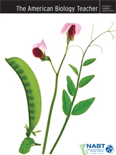
AMERICAN BIOLOGY TEACHER
Fostering Innovation in Biology Education for Tomorrow's LeadersAMERICAN BIOLOGY TEACHER, published by the NATIONAL ASSOCIATION OF BIOLOGY TEACHERS INC, is a vital resource for educators and researchers in the interconnected fields of biology education and agricultural sciences. With an ISSN of 0002-7685 and an E-ISSN of 1938-4211, the journal has been dedicated to promoting innovative teaching practices and enhancing the quality of biology education since its inception in 1970. Currently positioned in the Q3 quartile for both Agricultural and Biological Sciences (miscellaneous) and Education categories, it offers valuable insights and findings that address the pedagogical challenges faced by biology teachers today. Despite its non-open access model, the journal remains a critical platform for disseminating research that contributes to the professional development of biology educators in the United States and beyond. With a focus on practical applications and educational methodologies, AMERICAN BIOLOGY TEACHER aims to foster a deeper understanding of biological concepts among students, thereby shaping the next generation of scientists and informed citizens. Access to this journal continues to be an essential resource for those seeking to enhance teaching effectiveness and student engagement in the sciences.
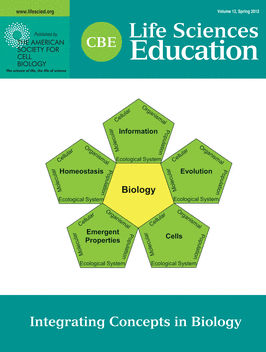
CBE-Life Sciences Education
Advancing Pedagogy and Understanding in the Life Sciences Field.CBE-Life Sciences Education, published by the American Society for Cell Biology, is a premier academic journal that bridges the fields of education and life sciences. With a robust impact factor reflected in its prestigious Q1 ranking in both Biochemistry, Genetics and Molecular Biology and Education categories in 2023, this journal is pivotal for researchers and educators alike. Its mission is to enhance learning and pedagogy across the biological sciences, fostering innovative educational practices that elevate the teaching and understanding of complex biological concepts. With a convergence of rigorous research and practical insights, CBE-Life Sciences Education serves as an essential resource for professionals and students committed to advancing life sciences education. The journal is available through traditional subscription, ensuring access to a wide array of valuable articles from 2006 to the present and beyond.
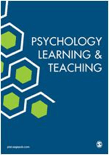
Psychology Learning and Teaching-PLAT
Empowering educators with cutting-edge research and strategies.Psychology Learning and Teaching (PLAT) is a distinguished academic journal published by SAGE Publications Ltd, dedicated to advancing the field of educational psychology. With an ISSN of 1475-7257 and an E-ISSN of 2057-3022, this journal serves as a vital resource for researchers, educators, and practitioners seeking to explore innovative teaching methodologies and learning strategies within the context of psychology. As of 2023, its reputation is underscored by its Q1 ranking in Education and Q2 ranking in Psychology (miscellaneous), reflecting its significant contributions to the scholarly community. Placing an emphasis on empirical research and practical application, PLAT publishes research that not only enhances educational practices but also addresses contemporary psychological issues. Open access options facilitate widespread dissemination of knowledge, while its robust impact factor highlights its influence within the educational and psychological discourse. This journal is essential for anyone committed to the intersection of psychology and education, providing thought-provoking insights that inspire ongoing dialogue and development in the field.

INSTRUCTIONAL SCIENCE
Exploring innovative methodologies for transformative learning.INSTRUCTIONAL SCIENCE is a premier academic journal published by Springer that focuses on advancing the field of education through research in instructional methodologies and practices. With an ISSN of 0020-4277 and an E-ISSN of 1573-1952, this journal is recognized for its rigorous scholarly contributions, evident in its impressive 2023 impact factor that places it in the top quartile (Q1) for both Developmental and Educational Psychology and Education. Situated in the Netherlands, the journal has a comprehensive publication history from 1972, making it a respected source for researchers seeking to explore innovative teaching strategies and learning processes. Its Scopus rankings further reflect its esteemed position, ranking #285 out of 1543 in Social Sciences – Education and #99 out of 360 in Psychology – Developmental and Educational Psychology, highlighting its relevance and impact within these fields. While currently not offering Open Access, INSTRUCTIONAL SCIENCE remains a vital resource for educators, psychologists, and students who are committed to fostering effective learning environments through evidence-based practices.
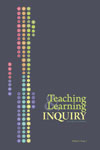
Teaching & Learning Inquiry-The ISSOTL Journal
Connecting educators and researchers for collaborative growth.Teaching & Learning Inquiry-The ISSOTL Journal, published by UNIV CALGARY PRESS, is a premier open access journal dedicated to enhancing educational practices and fostering scholarly discourse in the field of teaching and learning. With an ISSN of 2167-4779 and E-ISSN 2167-4787, this journal has been at the forefront of educational research since its inception in 2013, operating within a converged timeframe until 2024. Recognized with a Q2 ranking in Education and classified within the 55th percentile of Scopus’ rankings for education-focused social sciences, the journal aims to disseminate original research, theoretical inquiries, and practical applications that contribute to the scholarship of teaching and learning (SoTL). As an open access publication since 2016, it ensures that vital research is widely accessible, making it a critical resource for researchers, educators, and students seeking to advance their understanding and practice in the dynamic landscape of education. Based in Calgary, Canada, the journal continues to engage with innovative perspectives that shape and define the educational experience, making it an essential read for anyone invested in the future of teaching and learning.

Pegem Egitim ve Ogretim Dergisi
Nurturing Knowledge for the Evolving ClassroomPegem Egitim ve Ogretim Dergisi is a prominent academic journal published by PEGEM AKAD YAYINCILIK EGITIM DANISMANLIK HIZMETLERI TIC LTD STI, specializing in the field of education. Based in Turkey, this journal offers a platform for scholarly discourse, catering to both emerging and established researchers in the educational domain. With its ISSN 2148-239X, the journal aims to provide insights into contemporary educational practices, pedagogical innovations, and research findings that influence teaching and learning. Although classified in the Q4 quartile of the education category as of 2022 and achieving a Scopus rank of 1178 out of 1469, it remains a valuable resource for practitioners and academics alike. The journal ceased Scopus coverage in 2023, yet it continues to be a relevant outlet for educational research in Turkey and beyond. While it operates under traditional access models, the potential for collaborative research and knowledge sharing makes it a noteworthy choice for those engaged in the evolving landscape of education.

Turkish Journal of Education
Exploring Innovative Practices in Turkish EducationTurkish Journal of Education, published by MEHMET TEKEREK, is a prominent Open Access journal dedicated to advancing the field of education research since its establishment in 2012. With an ISSN of 2147-2858, this journal exemplifies a commitment to disseminating high-quality research that addresses contemporary issues and innovative practices in education. It serves as a vital resource for researchers, educators, and policymakers interested in the educational landscape of Turkey and beyond. The journal promotes accessibility to knowledge by offering free access to its articles, fostering a collaborative and inclusive academic environment. By engaging with a diverse range of topics, from pedagogical theories to educational technology, the Turkish Journal of Education strives to contribute significantly to the field and stimulate scholarly debate among its readers.
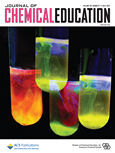
JOURNAL OF CHEMICAL EDUCATION
Empowering Educators, Inspiring StudentsJOURNAL OF CHEMICAL EDUCATION, published by the American Chemical Society, is a prestigious peer-reviewed journal dedicated to advancing the teaching and learning of chemistry. With a longstanding history spanning from 1924 to 2024, this journal plays a vital role in disseminating innovative research and pedagogical strategies that enhance educational practices in the chemical sciences. It boasts an impressive impact factor, ranking in the Q2 category for both Chemistry (miscellaneous) and Education in 2023, reflecting its significance within the field. The journal's robust Scopus rankings underscore its influence, with a percentile standing of 85th in Social Sciences _ Education and 67th in General Chemistry. Researchers and educators alike will benefit from its rich selection of articles and resources aimed at fostering effective teaching methodologies and improving student engagement in chemistry education. While currently not an open-access journal, readers can access its extensive archive and explore topics that bridge theoretical knowledge and practical application in the realm of chemical education.